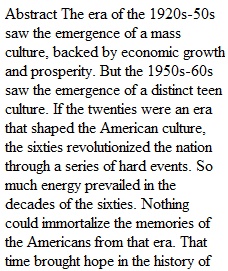


Q • Many historians look ahead from the 1960s to determine how the divisions of the 1960s may have led to future divisions in the 1980s and later. We are going to go the other direction and look back to determine to what extent these "revolutionary changes" of the 1960s were really revolutionary. In other words, did the cultural changes of the 1960s represent a fundamental break from the U.S. culture(s) of the 1920s-50s? Or did they represent a continuation of the types of changes that were already underway in U.S. culture in the 1920s-50s? • The 1970s were a decade of turmoil for the U.S. economy, U.S. presidential politics, and U.S. diplomacy/foreign policy. Which of these areas do you believe suffered the greatest setbacks and why? Which one represented the smallest setback and why? • Many historians credit the foreign policy approach and policies of Ronald Reagan and George H.W. Bush for the fall of the Soviet Union and the ending of the Cold War. Others argue that the Soviet system collapsed due to events unrelated to U.S. policy, including the decision to invade Afghanistan, the disaster at Chernobyl, etc. Which argument do you believe is more persuasive and why?
View Related Questions